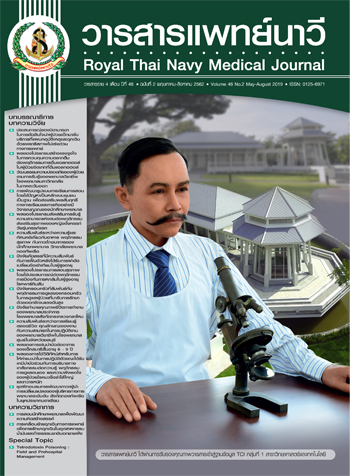The Effect of Play Therapy on Symptoms of Attention Deficit Hyperactivity Disorder in Children Aged 6 – 9 Years
Main Article Content
Abstract
The purposes of this quasi-experimental research were: 1) to compare symptoms of 6 - 9 year old Attention Deficit Hyperactivity Disorder Children (ADHA), before and after received play therapy and 2) to compare symptoms of ADHA children, aged 6 - 9 years, among children received play therapy and those received usual nursing care. Research sample consisted of forty children with ADHD, age 6 - 9 years, from outpatient clinic of Yuwaprasartwaithayopathum hospital, selected according to inclusion criteria and matched pair by age and gender, then, equally assigned to an experimental group and a control group. The experimental group received play therapy with caregiver involvement, composed of simple to complex play for 2 weeks. The control group received usual nursing care. Research instruments were: 1) personal data questionnaire of children with ADHD, 2) Swanson, Nolan, and Pelham IV scale (SNAP-IV), caregiver version, 3) nurses’ manual on play therapy, 4) play ability scale. All instruments were content validated by a panel of 6 experts. The reliability of SNAP-IV scale and play ability scale were 0.89 and 0.93, respectively. The t-test was used in data analysis. Major findings were as followed:
- The mean score of symptoms of ADHA among children after received play therapy was significantly that before, at the .05 level (t = 13.36).
- The mean score of symptoms of ADHA among children who received play therapy was significantly from symptoms of ADHA among children who received usual nursing care, at the .05 level (t = 4.50).
Article Details

This work is licensed under a Creative Commons Attribution-NonCommercial-NoDerivatives 4.0 International License.
References
2. American Psychiatric Association. Diagnostic and Statistical Manual of Mental Disorders. (DSM-V). 5th ed. Arlington, VA: American Psychiatric; 2013.
3. Buttross S. Attention deficit-hyperactivity disorder and its deceivers. Curr Probl Pediart 2000;30(2):41-50.
4. Maneerat S. Ability of ADHD caregiver. [Master’s Thesis, Faculty of Nursing]. Prince of Songkla University; 2007. (in Thai).
5. Piyasin W, Gateman P. Child and adolescent psychology 2. 1st ed. Bangkok: Tanapress; 2007. (in Thai).
6. Martin A, Volkmar FR. Lewis’s child and adolescence psychiatry: a comprehensive textbook. 4th ed. Wolters Kluwe: Lippincott William & Wilkin; 2007.
7. Barzegary L, Zamini S. The effect of play therapy on children with ADHD. Procedia-Social and Behavioral Sciences 2011;30(1):2216-8.
8. Abdollahian E, Mokhber N, Balaghi A, Moharrari F. The effectiveness of cognitive-behavioral play therapy on the symptoms of attention-deficit/hyperactivity disorder in children aged 7-9 years. ADHD Atten Def Hyp Disord 2013;5(1):41-6.
9. Janatian S, Nouri A, Shafti A, Molavi H, Samavatyan H. Effectiveness of play therapy on the base of cognition behavioral approach of symptoms of attention deficit/hyperactivity disorder (ADHD) among primary school male students aged 9-11. J Res Behav Sci 2008;2(1):110-2.
10. Panksepp J. Can play diminish ADHD and facilitate the construction of the social brain?. J can Acad child Adolesc Psychiatry 2007;16(2):57-66.
11. Ray D, Schottelkork A, Tsai MH. Play therapy with children exhibiting symptom of ADHD. International Journal of Play Therapy 2008;16(1):95-111.
12. Axline VM. Play therapy: the inner dynamics of childhood. 20th ed. New York: Ballantine Books; 1990.
13. Barkley RA. Attention-deficit hyperactivity disorder: a handbook for diagnosis and treatment. 3rd ed. New York: Guilford Press; 2006.
14. Knouse LE, Safren SA. Current status of cognitive behavior therapy for adult Attention-Deficit Hyperactivity Disorder. Psychiatr Clin North Am 2010;33(3):497-509.
15. Nigg JT. What causes ADHD?: understanding what goes wrong and why. [Internet]. [cited 2010 June 8]. Available from: https://psycnet.apa.org/record/2006-07725-000.
16. Patterson CH. Relationship counseling and psychotherapy. New York: Harper & Row; 1974.
17. Iamsupasit S. Theories and techniques in behavior modification. 2nd ed. Bangkok : Chulalongkorn University Press; 1991.
18. Ruengtragul A. Statistic applied to behavioral sciences 1. Educational Research and Psychology. Bangkok: Faculty of Education Chulalongkorn University; 2009. (in Thai).
19. Patterson CH. Relationship counseling and psychotherapy. New York: Harper & Row; 1974.
20. Re AM, Capodieci A, Cornoldi C. Effect of training focused on executive functions (attention, inhibition, and working memory) in preschoolers exhibiting ADHD symptoms. [Internet]. [cited 2010 June 8]. Available from: https://www.ncbi.nlm.nih.gov/pmc/articles/PMC4526792/.
21. Jamja P. The effect of stress management program on caregivers’ caring ability of children with Attention Deficit Hyperactivity Disorder. Royal Thai Navy Medical Journal 2019;46(1):32-48. (in Thai).


